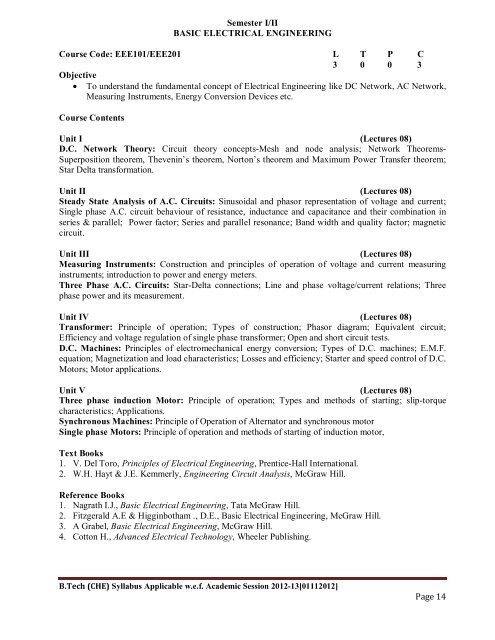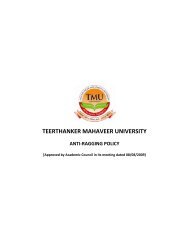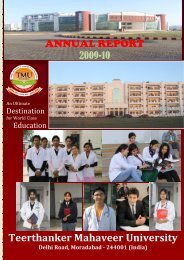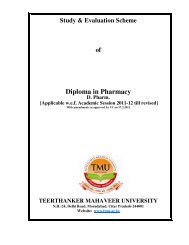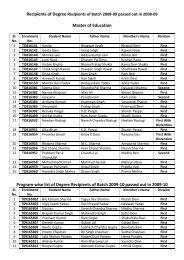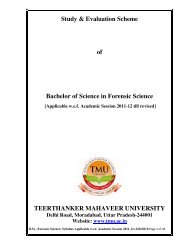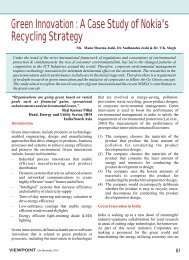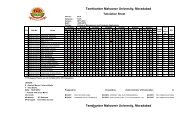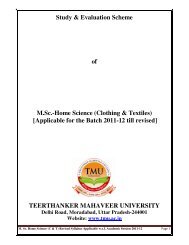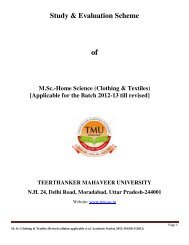Chemical Engineering - Teerthanker Mahaveer University
Chemical Engineering - Teerthanker Mahaveer University
Chemical Engineering - Teerthanker Mahaveer University
Create successful ePaper yourself
Turn your PDF publications into a flip-book with our unique Google optimized e-Paper software.
Semester I/II<br />
BASIC ELECTRICAL ENGINEERING<br />
Course Code: EEE101/EEE201 L T P C<br />
3 0 0 3<br />
Objective<br />
• To understand the fundamental concept of Electrical <strong>Engineering</strong> like DC Network, AC Network,<br />
Measuring Instruments, Energy Conversion Devices etc.<br />
Course Contents<br />
Unit I (Lectures 08)<br />
D.C. Network Theory: Circuit theory concepts-Mesh and node analysis; Network Theorems-<br />
Superposition theorem, Thevenin’s theorem, Norton’s theorem and Maximum Power Transfer theorem;<br />
Star Delta transformation.<br />
Unit II (Lectures 08)<br />
Steady State Analysis of A.C. Circuits: Sinusoidal and phasor representation of voltage and current;<br />
Single phase A.C. circuit behaviour of resistance, inductance and capacitance and their combination in<br />
series & parallel; Power factor; Series and parallel resonance; Band width and quality factor; magnetic<br />
circuit.<br />
Unit III (Lectures 08)<br />
Measuring Instruments: Construction and principles of operation of voltage and current measuring<br />
instruments; introduction to power and energy meters.<br />
Three Phase A.C. Circuits: Star-Delta connections; Line and phase voltage/current relations; Three<br />
phase power and its measurement.<br />
Unit IV (Lectures 08)<br />
Transformer: Principle of operation; Types of construction; Phasor diagram; Equivalent circuit;<br />
Efficiency and voltage regulation of single phase transformer; Open and short circuit tests.<br />
D.C. Machines: Principles of electromechanical energy conversion; Types of D.C. machines; E.M.F.<br />
equation; Magnetization and load characteristics; Losses and efficiency; Starter and speed control of D.C.<br />
Motors; Motor applications.<br />
Unit V (Lectures 08)<br />
Three phase induction Motor: Principle of operation; Types and methods of starting; slip-torque<br />
characteristics; Applications.<br />
Synchronous Machines: Principle of Operation of Alternator and synchronous motor<br />
Single phase Motors: Principle of operation and methods of starting of induction motor,<br />
Text Books<br />
1. V. Del Toro, Principles of Electrical <strong>Engineering</strong>, Prentice-Hall International.<br />
2. W.H. Hayt & J.E. Kemmerly, <strong>Engineering</strong> Circuit Analysis, McGraw Hill.<br />
Reference Books<br />
1. Nagrath I.J., Basic Electrical <strong>Engineering</strong>, Tata McGraw Hill.<br />
2. Fitzgerald A.E & Higginbotham ., D.E., Basic Electrical <strong>Engineering</strong>, McGraw Hill.<br />
3. A Grabel, Basic Electrical <strong>Engineering</strong>, McGraw Hill.<br />
4. Cotton H., Advanced Electrical Technology, Wheeler Publishing.<br />
B.Tech (CHE) Syllabus Applicable w.e.f. Academic Session 2012-13[01112012]<br />
Page 14


